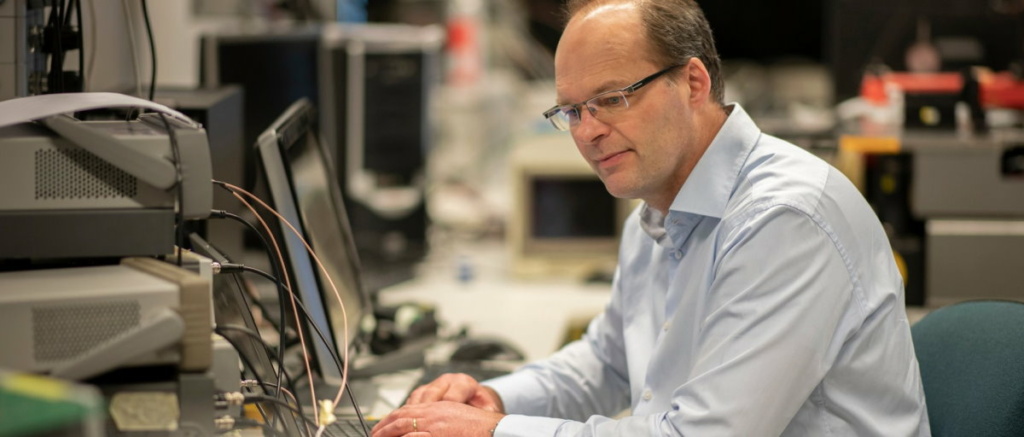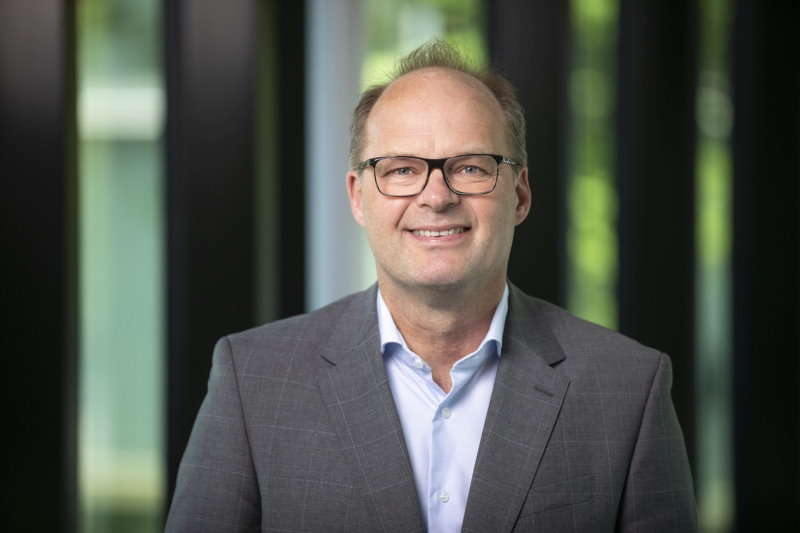
Twente’s chip design wizard Bram Nauta awarded the Stevin Prize
Chip designer Bram Nauta (1964) has been awarded the Stevin Prize, the Netherlands’ highest recognition for social impact as a result of groundbreaking research. Having recently celebrated his 25th anniversary at the University of Twente’s Integrated Circuit Design (ICD) department, Nauta enjoys worldwide renown for his IC designs, some of which have been implemented in chips used in smartphones, medical implants, aircraft and many other applications. These chips have sold in the billions.
Nauta’s most famous innovation may be the eponymous “Nauta circuit,” which he developed in the early nineties as part of his PhD thesis. Nauta devised a so-called differential transconductor, which was used to build an analog filter that can precisely lift the desired signal from a large number of signals. Applied in CMOS, the IC was orders of magnitude faster than anything on the market at that time. Consequently, mobile phones use less energy, data can be transported more quickly and the signal becomes significantly stronger.
The circuit has been incorporated in Nokia and Ericsson phones, hard disks and Texas Instruments products. According to an article in IEEE Solid-State Circuit Magazine, TI applied Nauta’s work in a device that sold 1 million units a day, a fact Nauta didn’t learn until 10 years later. Sven Mattison, one of the co-inventors of Bluetooth, has unveiled that the standard was based on the properties of the Nauta circuit. The circuit was never patented.
Later, together with his ICD colleagues at the UT, Nauta devised a thermal noise canceling technique. This provided a solution for the problem caused by the variety of communication standards used in global mobile telephony. The smart electronic switch can identify and strengthen the frequencies of the different standards, such as GPS, Bluetooth, Wi-Fi and 4G. It can also suppress intrinsic static using very compact circuits on a chip as receivers for many different wireless standards. This technique also opened the door to the development of ultra-low-power analog-to-digital converters.
Nauta’s presence turned the Twente region into fertile grounds for IC design companies and departments, including Ansem, Bruco and ItoM, which was recently acquired by Bosch. Axiom IC, now part of Teledyne Dalsa, is a spinoff of the UT’s ICD department and in turn, this company brought forth Axign. Nauta is a figurehead of the Chiptech Twente consortium, which aims to bolster the area’s semiconductor and photonics activities, both in terms of design and manufacturing.
The Hengelo-born expert’s academic accolades include the presidency of the IEEE Solid-State Circuits Society (2018-2020) and the program chair of the ISSCC, the world’s foremost IC design conference.

Award Ceremony
Stevin laureates, along with Spinoza Prize candidates for outstanding academic research, are nominated first by a select number of individuals. Two committees, one for each prize and consisting of international experts from academia and in the case of the Stevin Prize also from industry, then advice science financier NWO who to honor in any given year. The laureates each receive 1.5 million euros for further academic research and activities related to knowledge utilization.
This year, the committees put forth four winners. The other Steven Prize winner is Corien Prins, professor of Law and Information Technology at Tilburg University. Joyeeta Gupta, professor of Environment and Development in the Global South at the University of Amsterdam, and Toby Kiers, professor of Mutualistic Interactions at the Vrije Universiteit Amsterdam, have been awarded the Spinoza Prize.
The Spinoza and Stevin Prizes will be presented at an award ceremony on Wednesday 4 October 2023.
Main image credit: University of Twente





